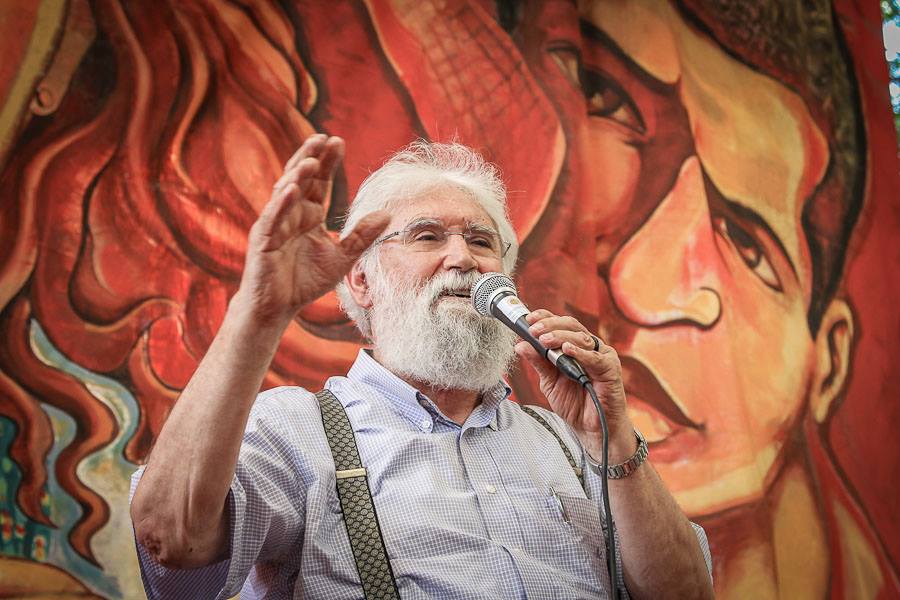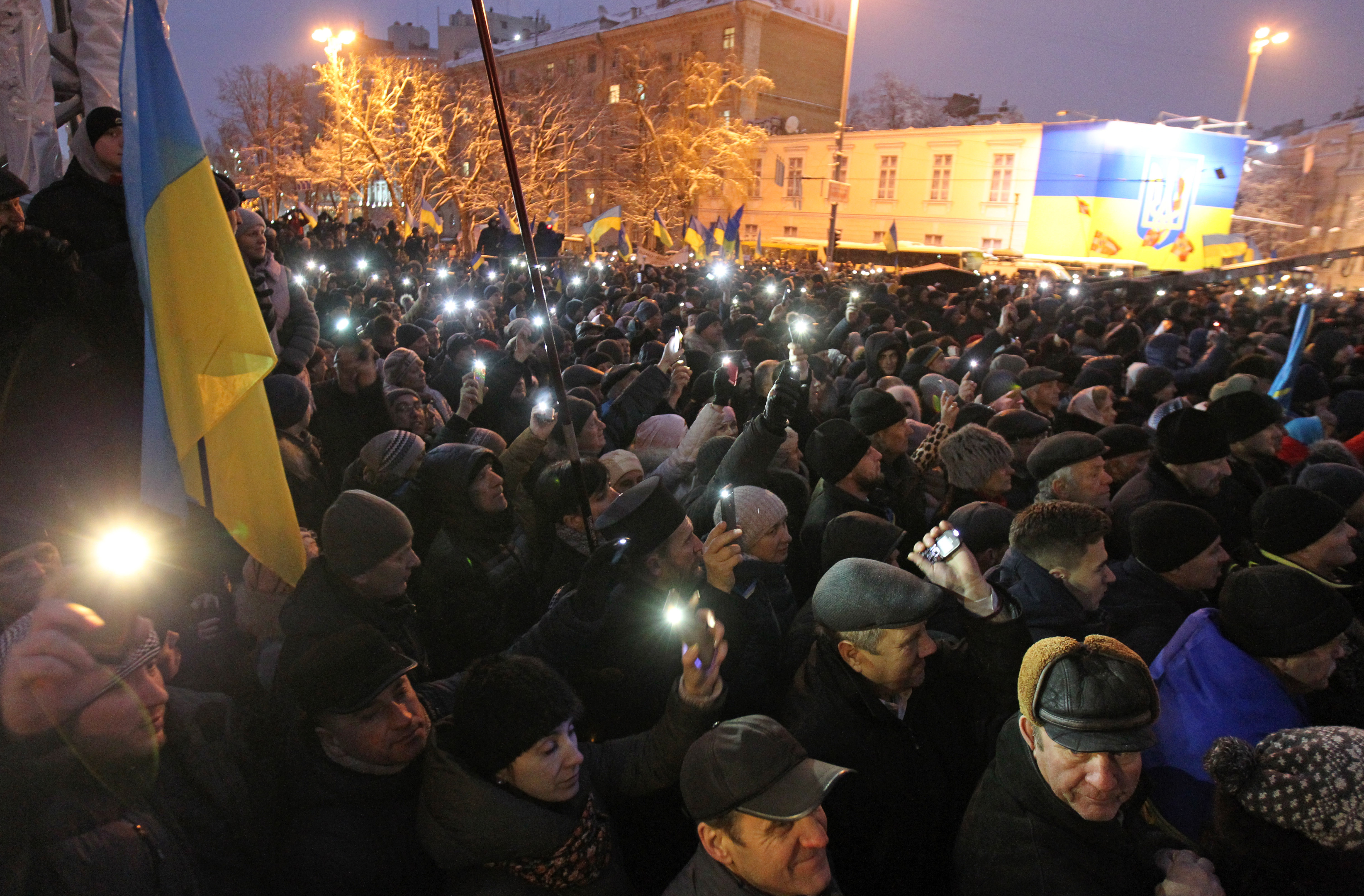Ukraine's new independent Orthodox primate has promised the doors of his church will be "open to all".
The Church is working in Ukraine for "peace and national harmony" in the war-torn country.
"I am convinced the Orthodox church, united and recognised, will faithfully serve its Ukrainian people, praying and leading it to salvation", said Metropolitan Epifaniy Dumenko. "We must complete the work of unifying Ukrainian Orthodoxy, valuing our theology and science, and praying for an end to war and the rule of a just peace".
The 39-year-old was speaking on Saturday evening after being elected to the new post of Metropolitan of Kiev and All Ukraine at a long-awaited Unification Council in the capital's St Sophia cathedral, attended by 192 bishops from Ukraine's three previously divided Orthodox communities.
The breakthrough was welcomed as a "miracle" by President Petro Poroshenko, who praised the "courage and wisdom" of Bartholomew I, the Ecumenical Patriarch, for authorising the church's creation and exercising his "unconditional canonical right to heal the wounds inflicted on Ukrainian Orthodoxy by Moscow's domination".
"This is a church without Putin", Poroshenko told thousands of applauding Ukrainians outside the Council meeting, "a church without prayers for Russia's leadership and Russia's army - because Russia's leadership and Russia's army are killing Ukrainians".
However, the Council was dismissed as "non-canonical" and "meaning absolutely nothing" by Archpriest Nikolai Balashov, a Moscow Patriarchate official, who told the Interfax news agency two rebel metropolitans from Ukraine's Moscow-linked Orthodox church who defied a ban by attending had been excommunicated. Meanwhile, the Russian church's external relations director described the two metropolitans as "traitors" and said other Moscow-linked clergy had shown "unanimity, perseverance and courage" in refusing to take part.
Metropolitan Hilarion Alfeyev said in an online article in Saturday: "This event's participants will be erased from the church's historical memory, like dust blown from the face of the earth. Despite the pressure exerted by the abduction of her bishops and the seizure of her churches and monastic properties, the canonical church has stood and will continue to stand – the gates of hell will not overcome it".
Russia's Orthodox church formally severed ties with the Ecumenical Patriarchate in retaliation for an October decree, which ended its 332-year jurisdiction over Ukraine and recognised the country's breakaway Kiev Patriarchate and Autocephallous church and their leaders. The creation of a separate Ukrainian church by Patriarch Bartholomew, who is honorary primate of the world's 300 million Orthodox Christians, was given final approval by his Istanbul-based Holy Synod in a 29 November decree, following his insistence that Ukraine's 40 million Orthodox Christians were entitled to their own independent church after enduring an "absurd schism".
Speaking after the Unification Council, President Poroshenko repeated earlier assurances that state officials would not "interfere in church activities" and protect the "free choice" of Ukrainians to belong to their preferred denomination. However, in a letter last week to the Pope and the United Nations secretary-general, Antonio Guterres, as well as Germany's Chancellor Angela Merkel and President Emmanuel Macron of France, Patriarch Kirill of Russia said clergy from the Moscow-linked church's 13,000 parishes and 200 monasteries had been interrogated and accused of "high treason" by Ukrainian officials and faced "full-scale persecution" as their offices and homes were searched.
"We do not know what further steps the Ukrainians will take, or which further infringements of essential human and civil rights they may decide to commit", said the Patriarch, whose letter was also sent to the Anglican Archbishop Justin Welby of Canterbury, and leaders of the Geneva-based World Council of Churches. "But Ukraine's state authorities are gravely interfering in church life right before our eyes, as basic human rights, including the fundamental right to freedom of conscience, are violated".
Preaching at Chernivtsi, the head of Ukraine's Greek Catholic church, Archbishop Svetoslav Shevchuk, said Catholics were not involved in "the Orthodox community's internal affairs", but should pray for Orthodox unity, as well as for Ukrainian prisoners of war "tormented in Russian prisons". Meanwhile, the chairman of the Vatican's Pontifical Council for Christian Unity, Cardinal Kurt Koch, told a German online news agency Rome had "remained neutral, taking no position" on the inter-Orthodox feud, but counted on maintaining "bilateral talks and contacts" with the Moscow Patriarchate, despite warnings that ecumenical ties could now suffer.
Born at Ivanono, near Odessa, Metropolitan Epifaniy trained in Kiev and Athens, and served as secretary and chancellor to the Kiev Patriarchate's leader, Filaret Denisenko, before being consecrated an archbishop in 2012, after rapid promotions, aged just 32. The Ukrayinska Pravda daily said police had patrolled central Kiev and guarded religious buildings during Saturday's Council meeting to "ensure public security and deter provocations", after Ukraine's security service, the SBU, claimed on 13 December to have prevented planned violence in Kiev, Odessa and other cities, designed to create "bloody images for the Russian media".
Speaking on Saturday, President Poroshenko said he would accompany the new Orthodox primate, who will not have the title of patriarch, to Istanbul on 6 January for the handover of a formal decree, or tomos, canonically establishing the new church. He also praised the 89-year-old Filaret, who declined to stand for the post, as "spiritual leader of the Ukrainian people", and lauded the courage of the few Moscow-linked clergy who attended the council "despite pressure, threats and curses from Moscow".
"This is the last step in the millenial history of a great dream - a great statehood issue is now being resolved", Poroshenko told the Council participants. "We have gained spiritual independence, and this can be compared with political independence. We are cutting off the chains that bind us to the empire and returning to our God-determined path".



 Loading ...
Loading ...